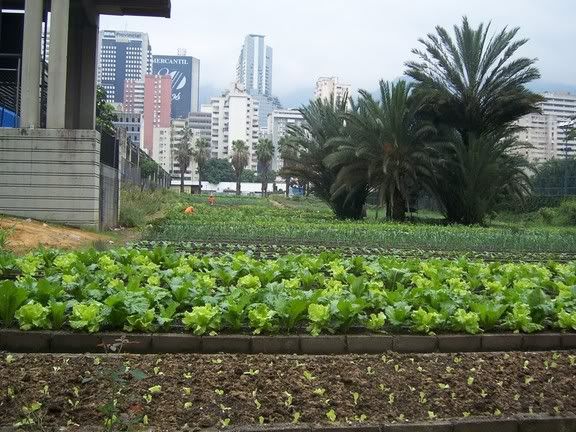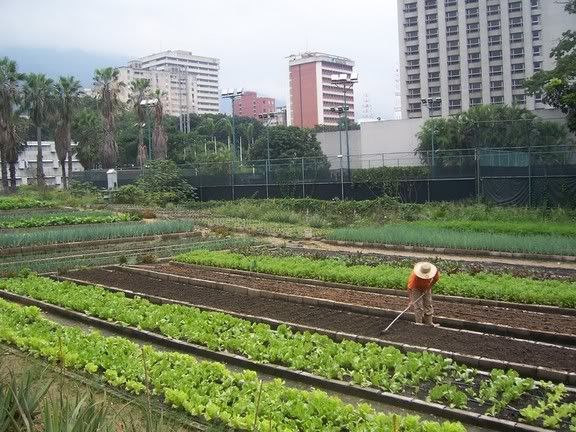Tuesday, April 03, 2007
So crazy he’s ahead of the curve
One relatively minor initiative of Chavez is having small urban farms set up in various Venezuelan cities, including Caracas. The one located in central Caracas next to the Hilton Hotel is the most famous and here are some pictures of it:


Of course this initiative, as with every one that Chavez has undertaken, has been roundly ridiculed by those who oppose Chavez, the most coherent criticism being found here.
I have to admit the idea of growing lettuce in Caracas seemed rather silly to me too. So you can imagine my surprise today while munching on lettuce at lunch, I ran across the following in the Wall Street Journal:
The New York magazine article can be found here.
Turns out, even the United Nations Food and Agriculture Organization is big on urban farms saying:
I guess Chavez isn’t so off the wall about this after all. Note to self: next time Chavez appears to be loony, he probably isn’t. He’s just ahead of the curve.
|


Of course this initiative, as with every one that Chavez has undertaken, has been roundly ridiculed by those who oppose Chavez, the most coherent criticism being found here.
I have to admit the idea of growing lettuce in Caracas seemed rather silly to me too. So you can imagine my surprise today while munching on lettuce at lunch, I ran across the following in the Wall Street Journal:
Crop Farms in Skyscrapers: Feasible or Pie-in-the-Sky?
The only hope of feeding the Earth’s expanding population without exacerbating global warming is to create an infrastructure of urban farms, a Columbia University scientist says. Don’t worry about finding enough space, he says – crop farms could be built into urban skyscrapers.
Dickson Despommier, a professor of environmental sciences and microbiology, says that skyscraper farms represent a feasible strategy for growing food while protecting the environment, Lisa Chamberlain reports in New York magazine.
The New York magazine article can be found here.
Turns out, even the United Nations Food and Agriculture Organization is big on urban farms saying:
And as new, urban lifestyles lead greater numbers of people to consume more fats and less fibre, more fast food and fewer home-cooked meals, developing countries face a double challenge - widespread hunger on the one hand and rapid increases in obesity, diabetes, cardiovascular diseases and other diet-related diseases on the other.
One part of the solution: growing food in or near cities
Urban and peri-urban agriculture can help improve food security in several ways: growing food at home or via a cooperative reduces the cost burden of acquiring food for the poor, puts more food within their reach, and reduces seasonal gaps in fresh produce.
Also, by increasing the diversity and quality of food consumed, it can significantly improve the quality of urban diets.
Sales of surplus produce, meanwhile, can generate income that can be used to buy more food. Even small "micro-gardens" can bring in up to $3 a day for poor families, according to FAO.
I guess Chavez isn’t so off the wall about this after all. Note to self: next time Chavez appears to be loony, he probably isn’t. He’s just ahead of the curve.
|
